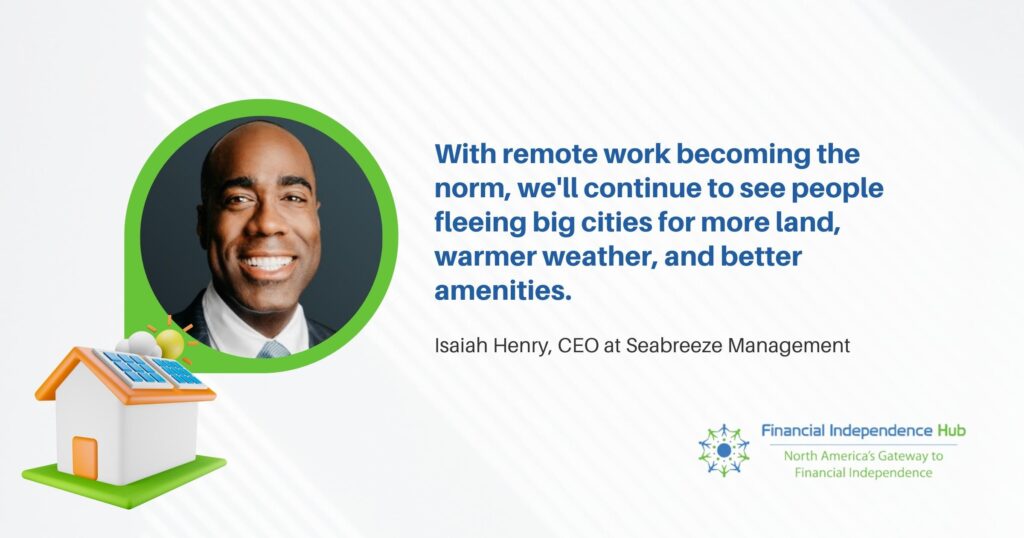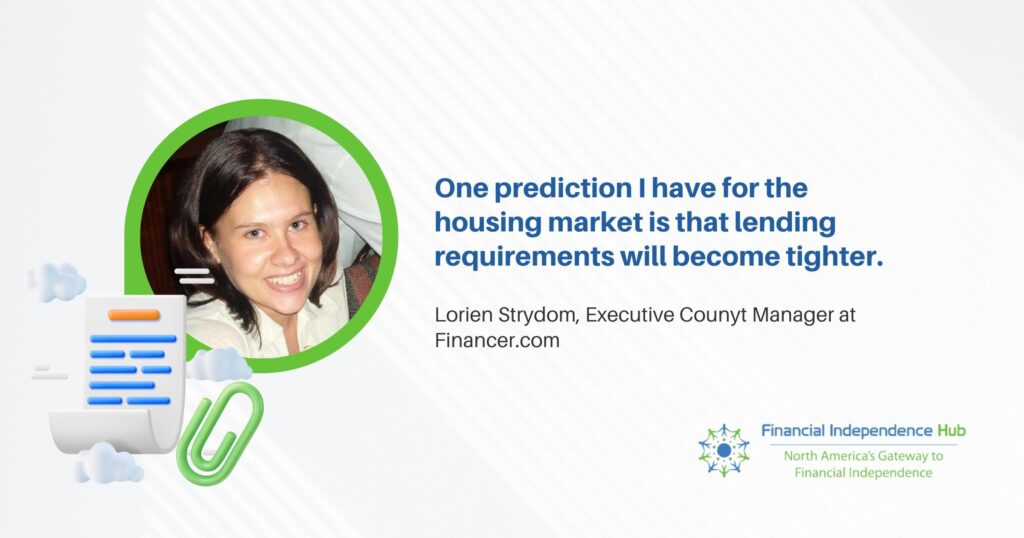What is one prediction you have for the housing market in the next five years?
To help you stay abreast of developments in the housing market, we asked real estate professionals and business leaders this question for their best predictions. From more people heading south to buyers shifting toward simple and functional homes, there are several insightful predictions that may help inform your decisions as a buyer, homeowner, developer or other stakeholder in the housing market within the next 5 years.
Here are nine housing market predictions for the next 5 years:
- People Will Be Heading South
- Expect a Good Degree of Stabilization
- Lending Requirements Will Get Tighter
- Home Values are Steadily Rising and Stabilizing
- Look for Sell-Off by Big Owners
- More Smaller and Affordable Houses
- Expect More Use of Digital Tools to Promote Sales
- Home Prices Will Continue Upward but Much More Gradually
- Tastes Will Shift Toward Simple and Functional Homes
People will be Heading South
With remote work becoming the norm, we’ll continue to see people fleeing big cities for more land, warmer weather, and better amenities. Southern states such as Florida, South Carolina, Alabama, and Tennessee will see an increase in home buyers. Fewer people will be moving to the Northeast in favor of a lower cost of living, mild winters, and the ability to be outside 365 days of the year. — Isaiah Henry, Seabreeze Management
Expect a good degree of Stabilization
I think the market will stabilize somewhat, short of any significant downturn. Prices have shot up dramatically in recent years, so if they come down a bit now, that’s not a crash, it’s just a return to Earth. Anyone fearing something like the crash of 2008 should rest easy, as the same conditions are simply not there in terms of inventory, unemployment, and subprime lending. Expect prices in the near future to be somewhat closer to normal, but not dramatically so. — Marcus Hutsen, Patriot Coolers
Lending Requirements will get Tighter
One prediction I have for the housing market is that lending requirements will become tighter. This is because, after a period of loose lending standards, there has been an increase in the number of people defaulting on their mortgages. Lenders are becoming more cautious, and as a result, it will become harder for people to get mortgages. This could lead to a slowdown in the housing market, as fewer people will be able to buy homes. However, it could also create opportunities for investors who are willing to buy properties and rent them out. In any case, the housing market activity is likely to slow down in the next few years. — Lorien Strydom, Financer.com
Home Values are steadily rising and stabilizing
While we can’t magically forecast the future of real estate, it’s pretty safe to assume that home values are going up steadily just as they historically have. That doesn’t mean we won’t see the typical peaks and valleys that result from economic and other variable factors, rather confirm that the housing market fluctuates slightly over time which is normal. Those concerned the 2008 crisis could repeat can be at ease when considering the regulatory measures taken since to avoid straining our economy. It seems unlikely we would see such an event in the US again, and though buyer trends have been irregular in recent years, the data would support steady home values for the foreseeable future. — Tommy Chang, Homelister
Look for Sell-Off by Big Owners
One prediction I have is that the big companies that have been paying outrageous amounts for homes will suffer financially and need to sell them off. The idea behind these conglomerates, which some are foreign-owned, is to buy up private properties and either rent them or flip them for a profit. That is what has caused rents to soar and has pushed many would-be homeowners or independent house flippers out of the market because they can’t compete with the bid price.
However, I believe these large companies have overplayed their hand. People won’t always pay a high rent price. They will find other options like moving in with family, renting a trailer, using low-income housing, or renting an apartment. Home values faced a sudden decline this summer and will decline further if the U.S. economy tanks. That will force many of them to sell off excess properties and will be a boom for those looking for homes. — Bruce Tasios, Tasios Orthodontics
Smaller and Affordable Houses
It is now hitting a low because of the economy and inflation and that will last a little while. However, in five years, I see more smaller, affordable homes being built and sold due to customer demand. People aren’t able to get the bigger mortgages they once did and the days of the “McMansions” are over. People think they’re wasteful and rather have money in the bank. Banks are tightening on loans anyway so many can’t qualify for what’s on the market now.
The housing trend in five years will be similar to what happened post WW2 when many families got small suburban homes that were highly affordable and safe where they could raise their families. I think we may be going back to that either by refurbishing many of the homes that still exist to renew the community or building similar communities that people can afford. — Fadi Swaida, Halton Village Dental
Expect more use of Digital Tools to Promote Sales
Expect digital tools to continue to impact the housing market, with more and more real estate agents leaning towards using video tours to promote their properties.
While it was initially done due to the pandemic and a ‘needs must’ kind of situation, a lot of benefits have actually come out of this tool. It allows potential buyers to get an objective view of what a property looks like in comparison to the typical photos you see on sites, and can help a consumer decide whether it is worth viewing the property. While this may sound counter-intuitive to selling a property, it actually acts like an initial viewing, meaning that when you are showing people around the property physically, you are dealing with people who are definitely interested and are using this as a way to make sure they are happy.
It saves time and money for agents and means that the percentage of people who may make an offer after a physical viewing skyrockets because this is their confirmation viewing, not the initial one. — Hardy Selo, Property Guru
Home Prices will continue Upward but much more gradually
Even as interest rates rise, they are unlikely to have an impact on home prices that are favorable to buyers. Even substantial rate increases, whether for residential use or as investment properties, in their opinion are insufficient to bring down real estate values.
The paucity of supply and rising demand are anticipated to persist until 2022 and beyond. Housing costs will rise if we only use the law of supply and demand as a basis. The housing market may be slowed down by the skyrocketing loan rates, but home values will still rise.
The amount of people relocating from states with costly housing to those with more affordable costs is another factor contributing to ongoing increases in house prices. Most city people are moving out into the suburbs, where the cost of living is lower, as a result of business pandemic-induced changes that now permit employees to work remotely. Given the new normal to which we have all adjusted, this trend has the best chance of continuing. — Kathryn Snapka, The Snapka Law Firm
Tastes will shift toward Simple and Functional Homes
The homebuyer has become bored with the sterile grays, white cabinets, and chunky-two-story homes with accentuated exteriors. I believe part of the lull in real estate markets also has to do with homebuyers not being excited about how homes look. We’ve seen the same trends for about 15 years now. It’s time for a change.
Five years from now new construction homes will look different than they do today. Exterior and interior designs will likely become more simplistic emphasizing use and function over appearance. Modern, straight lines, and varying ceiling heights will be featured inside homes. Exteriors will be simplified in appearance but likely include more features where the homeowners can more seamlessly enjoy the indoors and the outdoors. Homebuyers lack the aspirational motivation to make a purchase because what they own now does not look different enough from what they can buy. To keep the market moving new home designs will be prevalent five years from now. — Chuck Vander Stelt, Quadwalls
Terkel creates community-driven content featuring expert insights. Sign up at terkel.io to answer questions and get published




